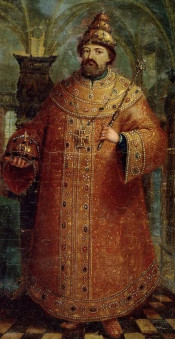
The Presidential Library marking the 410th anniversary of the coronation of Mikhail Feodorovich
One of the most important events in the history of the Russian state, the coronation of Mikhail Feodorovich Romanov, which marked the foundation of a new dynasty that ruled Russia for 304 years took place 410 years ago, on July 21 (according to the old style - July 11), 1613.
The coronation of Mikhail Feodorovich was held in the Assumption Cathedral of the Moscow Kremlin on Sunday, on the eve of the 17th birthday of the young sovereign. In the early morning, crowds of festively dressed people of various classes began to fill the streets and squares of the Kremlin to witness the occasion. Those who were admitted to the Assumption Cathedral were asked to stand "with silence, meekness and attention".
The cathedral was covered with carpets and velvets, a “great place” was arranged in front of the altar - a platform upholstered in red cloth, where 12 steps led. Mikhail Feodorovich made a speech from it. Unlike his predecessors, Mikhail Romanov did not just declare his will to the coronation. He explained exactly the legitimacy of his intention.
Metropolitan Ephraim, who performed the ceremony of the royal coronation, in his response speech also justified the rights of the new dynasty to the throne and blessed the first of the House of Romanov to reign.
The coronation of Mikhail Feodorovich Romanov began with the laying on of him by the metropolitan of regalia: a life-giving cross, a barm, a royal crown - Monomakh's Cap; the presentation of the scepter and orb. During the liturgy, a golden chain was placed on tsar, and then chrismation was performed. After communion, the tsar was showered with "gold and silver money". On the same day, a feast was held in the Faceted Chamber of the Moscow Kremlin.
The next day, July 22, the royal name day was celebrated. The young sovereign turned 17 years old according to S. Rozhdestvensky’s book The Accession of Mikhail Feodorovich Romanov and His Coronation (1913).
Some historians believe that the coronation of Mikhail Feodorovich was a more important event than his official election, which took place on March 3 (February 21, according to the old style), 1613. The anointed of God is no longer just an elected sovereign. He cannot be slandered, pushed aside, re-elected. The country became “not stateless”, but acquired an autocrat, a legitimate tsar.
The burden was really heavy. According to the historical essay by Nikolai Korolkov Events of the Time of Troubles in Rus' (1912): “<…> The Russian land was torn to pieces, devastated. It seemed that the end of the Muscovite state, which was left without a sovereign, was about to happen”. It was necessary to unite the tormented country, and the first step along this path was the expulsion of the Poles from Moscow in 1612 by the people's militia led by the Nizhny Novgorod merchant Kuzma Minin and Prince Dmitry Pozharsky.
The second most difficult task was the election of a new Russian tsar. In January 1613, the Zemsky Sobor opened in Moscow, which "sessed for a long time and restlessly". Only on March 3 (February 21) “by the council of all the earth” “after careful consideration and reflection, after a three-day general fast and zealous prayer to God: too great a thing was done! ... the tsar was elected unanimously”. Boyar Mikhail Feodorovich Romanov was supposed to become him. The Sobor decided to send to him and to his mother, nun Martha, who then lived in the Ipatiev Monastery, The Election of Mikhail Feodorovich Romanov to the Tsardom (1913).
“It was terrible for a sixteen-year-old youth to take on his conscience and answer before God the disgraced native land and the tortured Russian people”, - says the the 1871 edition “Russian Sovereigns. Tsar Mikhail Feodorovich”, which electronic copy is available in the Presidential Library. - “Refusing the crown means leaving Russia be pogrom and plundered by enemies; to take care of the Tsar means to save native Rus' from misfortune, grief and adversity. And the boyar decided to take on the royal title. The Russian state had a tsar who not only successfully ruled the country for 32 years, but also laid the foundation for a new dynasty.
“The coronation of Tsar Mikhail Feodorovich Romanov ended an unforgettable historical event - the accession of the House of Romanov in Rus'”, - writes Vladimir Golubev in the book The Tercentenary of Great Remembrance (1913).
This and other publications that illustrate the reign and personality of Mikhail Feodorovich, the first tsar from the House of Romanov are available in the Presidential Library’s collection The Zemsky Sobor of 1613. The Rise of a New Dynasty.

